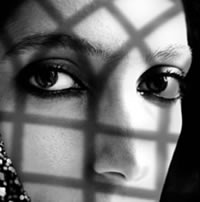Poetry
When a Eucharist of Humility is Rejected
by Lisa Samson
 A dead cold body hung on a tree.
A dead cold body hung on a tree.
I came to feast; I [...]
Confess to ignorance
I do not know you, although
I have loved you twenty years
The lifting of your lashes
Like the iris
in the side yard,
I have stopped blooming.
Dig me up, O Spirit,
and split me; where I have grown
calloused, break me open;
Before he was killed in World War I—tragically, just days before the Armistice—the poet Wilfred Owen wrote these words as preface to the book he never got to hold in his hands: “
I cannot tell you why
I taste death;
the cupboards
are reasonably
arranged,
the windows clean as rain.
while climbing towards
phantasmal blue
has broken—
we lie on concrete,
begging with a
shattered golden bowl.
My breath pluming white into December
could, to God, be incense rising out
of the puffing thurible of my body.
Up here, it’s impossible to tell for the fog
From far-out depths they come,
swell swelling swell,
'til cresting they salute the sky
and tumble towards sand that waits immemorially
to receive them.
Summer u
- noticing the migrant workers—
- two to a wheelbarrow of concrete—
- mending the walls of the rich
- that exclude them
we nailed God down
He's at the back of the property
He's going nowhere, sir
His feet are stuck
to a block of wood
It's comical, sir
Common Life, Robert Cording's fifth poetry collection, is informed by religious faith and enacts it.
I went there once,
to the place you’re imagining.
It was purple, with wild geraniums
under green-bright stars.
All the constellations spelled
words, like &
After the olive groves at Samothrace and fog
which billowed up from a green sea,
the rocky sheep path and bleating ewes,
wind and sun—there w
Using the translated texts of sacred mystical poetry, David Wilcox and his wife, Nance Pettit, have created a recording of spare and intimate beauty, a product of evenings spent by the fire delighting in the words of ancient poets.
At the regional airport in Waco, on the third day
of the war, we stand barefoot, as if on sacred ground.
As each in turn is beckoned, we file mutely past
the metal box that peers into our carry-ons and coats,
examines our watches, our wallets, our shoes.
"
as if religion were a state of shock,
deep, peaceful shock, that
men like these
are driven into by the spectacle of reality."
Peter Matthiessen in The Cloud Forest
